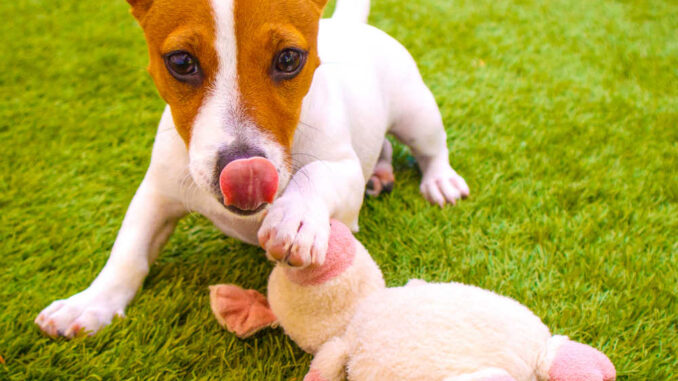
This article was updated on March 15th, 2024

When your dog licks his toys, it might be a simple act of enjoying their favorite stuffy or squeaker. But if your pup is excessively licking, it could also indicate a behavioral or even a medical issue. In this article, our Certified Dog Behaviorist Mindy Waite, Ph.D. explains why dogs lick their toys and how you can help.
Key highlights:
– The sensation of licking can soothe a dog or feel good to them. It also helps them meet their needs to explore and play
– Some dogs may lick their toys because they taste good to them
– Too much licking could point to a medical or behavioral issue: excessive licking could be due to boredom, anxiety and other medical conditions like canine compulsive disorder (CCD)
– Pet toys are among the germiest objects in our homes. Owners should wash dog toys at least once a month
It’s normal for most dogs to lick their toys, but excessive licking could point to a medical or behavioral issue
Dr. Waite can think of a few possible reasons dogs lick their toys, some completely normal and others a reason to chat with your vet.
“Just as we humans rely a great deal on our hands as we carry out our daily activities, dogs use their mouths a lot to explore the world and keep themselves occupied,” writes Richmond Society for the Prevention of Cruelty to Animals (SPCA).
“The sensation of licking can even soothe a dog or feel good to them. But too much licking of toys can point to a medical or behavioral issue.”
Dogs tend to lick their toys as a fun way of exploring and playing
Especially when they’re a puppy, and even more likely when they’re teething, dogs mouth all kinds of things like their toys, you, and other pups. Licking and mouthing are common behaviors during puppy development and exploration—just be sure to encourage your puppy to mouth appropriate objects like teething toys for puppies.
Puppies are more likely than adult dogs to be caught with a non-food item in their mouth, but that doesn’t mean your adult pup will ever fully outgrow their curious behaviors.
If your adult dog still mouths his favorite toys, he might find comfort in his happy puppy habits. Exercising the jaw is healthy, and licking can be a soothing activity for many pups. So, consider offering a doggy chew toy.
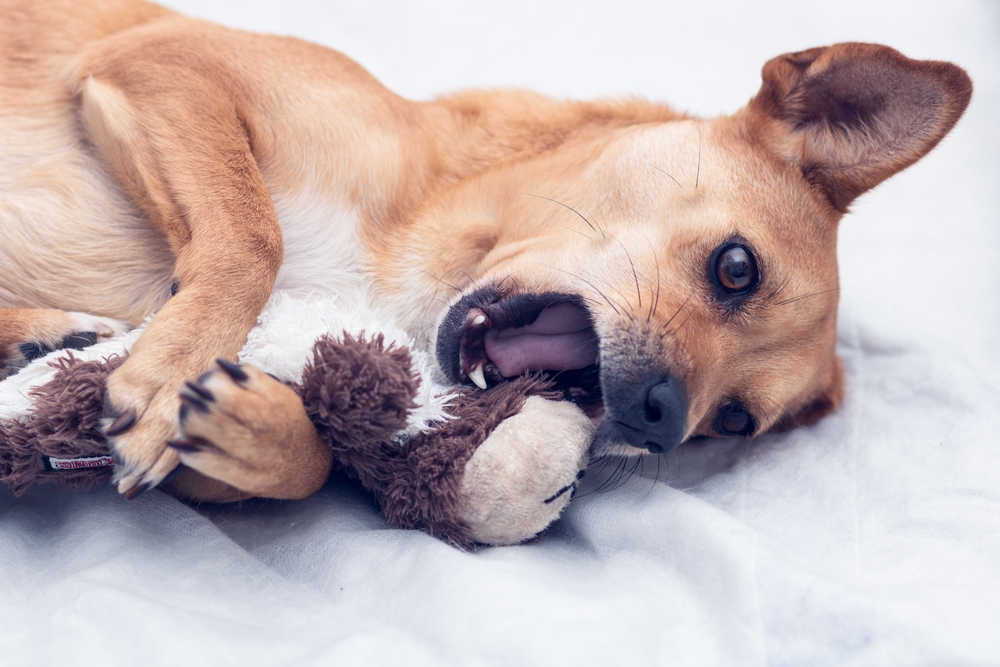
Some dogs may lick their toys because they taste good to them
Is the toy your dog loves licking the Kong you fill with peanut butter? Or do you keep the toy stored away next to the doggy treats? “The toy might taste or smell like food,” Waite says, and we can’t blame them for wanting another lick.
If it’s around dinner time or you’ve noticed the water bowl is low, your pup might also be signaling that they’re hungry or thirsty.
Dog toys are among the germiest objects in our homes & should be washed at least once a month
Instead of digestive enzymes, the saliva of a dog is packed full of anti-microbial and anti-bacterial proteins—killing germs before they can make it to your pup’s gut. While your dog’s mouth might have anti-germ properties that can help protect your dog from some infections, the National Sanitation Foundation (NSF) warns that pet toys are among the germiest objects in our homes.
Whether your dog excessively licks his toys or not, studies found that many pet toys harbor harmful organisms like bacteria, yeast, and mold.
To keep you and your dog safe, NFS recommends washing hard and soft dog toys at least once a month. If your dog loves licking their toys, sanitizing them more often is a good idea.
Excessive licking could be due to boredom, anxiety, and other medical conditions like canine compulsive disorder (CCD)
If you’re wondering why your dog is always licking their toys, Dr. Waite says to consider these likely culprits. If any of your dog’s behaviors are out of the ordinary or concerning, it’s a good idea to speak with your vet, who can diagnose any underlying health issues and provide an appropriate course of treatment.
1. Boredom
If your pup is slobbering all over his toys as you read this, he might be bored and want some quality attention, play, and exercise. While varying in abilities, dogs of all sizes, ages, and breeds need mental and physical stimulation.
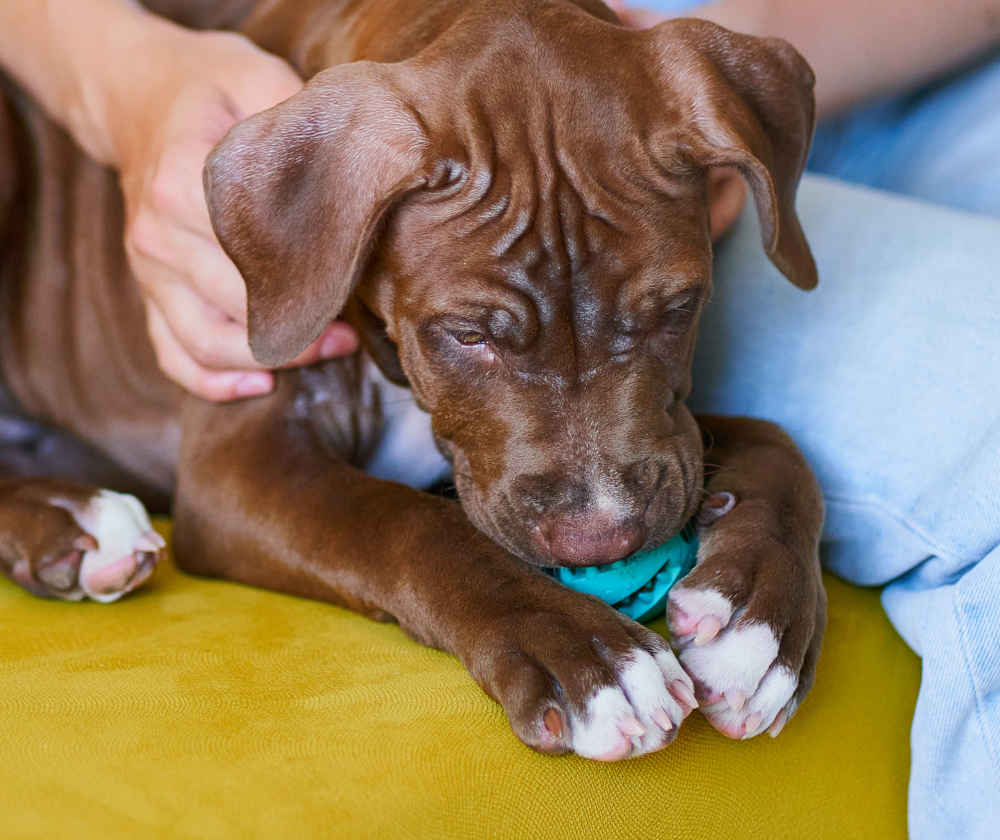
2. Pica
Dogs who lick their toys could be exhibiting a dangerous behavioral urge called pica. If you routinely catch your dog eating non-food items like fabric, dirt, and rocks, they likely have this disorder. It’s difficult to pinpoint the cause of pica, but it could be part of exploration, an outlet for anxious tendencies, or caused by an underlying medical condition. “If your dog is constantly licking non-food items, I would suggest taking them to a veterinarian just to be on the safe side,” Waite says.
3. Nausea
Dogs get nauseous too, and it’s brought on by several culprits like a change in diet, motion sickness, eating something they shouldn’t have, allergies, medications, and more. If your dog is feeling queasy, they might lick to self-soothe, because they’re hyper salivating, or to get the bad taste out of their mouth.
4. Anxiety
Does your dog lick their toys during stress-inducing events like during a thunderstorm or when you’re getting ready to leave the house? Waite says your dog might find the sensation of licking his toys soothing, especially when experiencing anxious feelings. Anxiety in dogs can occur at any age and might manifest as general anxious feelings or separation anxiety in dogs. Senior dog anxiety can develop over time or come on suddenly.
5. Dental disease
If your dog is excessively licking, has bad breath, is drooling more than usual, or is having difficulty chewing their food—then it’s time to see their vet. They could have chomped on something sharp or have inflamed gums, known as gingivitis.
6. Canine compulsive disorder
If your dog has a habit of repeating everyday activities like excessive licking, pacing, or patterned barking, they could have canine compulsive disorder (CCD). While all dogs can develop this disorder, certain breeds, including German Shepherds and Australian cattle dogs, are genetically predispositioned for the condition.
7. Dementia
Just like older humans, older dogs can develop dementia. It’s called cognitive dysfunction syndrome (CDS) and can cause issues with sight, hearing, and smell. It might also contribute to some bizarre behaviors like excessively licking their toys, walking in circles, and snapping at their tail.
Around 50% of dogs who are eight years or older show some signs of this condition, and by age eleven, it’s over 60%. If you’re noticing signs of doggy dementia, it’s important not to chalk up the behaviors as “old age” and speak to your vet for the best care of your senior pup.
8. Neurological issues
Neurological conditions can cause excessive licking. Typically, a neurological disease will also be accompanied by other signs and symptoms like an unusual gait or odd movements.
So how do you know if your dog might have a problem?
If your dog’s behavior is new or out of the ordinary, it’s best to see your vet. Other signs your dog needs to see the vet when licking their toys include:
- Dropping food when eating
- Increase in drooling
- Change in appetite
- Loss of interest in play
- Inappropriate urination or defecation
- Licking toys occurs during stressful events (anxiety)
When in doubt about your dog’s behaviors, it’s always a good idea to chat with medical professionals or a canine behaviorist.
Should I stop my dog from licking their toys?
“It’s fine if a dog has a particular toy that they really enjoy,” Waite says. In fact, a favorite toy can be useful for training activities. But if your dog is excessively licking their toy, it’s a good idea to draw their attention to other stimulating activities.
Wondering what activities are suitable for senior dogs? “Dogs [of all ages] love to engage in training because it means they get to hang out with their favorite person while also receiving treats,” Waite says. “They can often become really passionate about doing scent work activities, where you teach your dog to find an object that you’ve hidden.”
If your dog finds licking to be a soothing activity, consider serving treats or meals on lick mats or in puzzles. “Expand their toy preference repertoire by bringing in similar toys and then slowly expanding the different characteristics or uses of toys,” Waite suggests.
FAQ
Why does my dog lick his toy after they play?
Chances are that your dog has a positive association with both their toy and the sensation of licking. If your dog licks their toys after a play session, they’re probably winding down and relaxing.
Is it okay if my dog is obsessed with one toy?
“It’s fine if a dog has a particular toy that they really enjoy,” says Senior Tail Waggers’ Certified Dog Behaviorist Mindy Waite, Ph.D. In fact, a favorite toy can be useful for training activities. However, even the best dog toys may break or get lost, so it’s ideal if the pup has multiple toys they can enjoy.
My dog brings its toys everywhere. Is that normal?
If your dog loves to bring their toys everywhere they go, including on walks and to bed, they likely feel safe, secure, and relaxed when they have their toys. If your dog is carrying one or more toys everywhere, the behavior isn’t worrisome and doesn’t need to be discouraged.
Disclaimer: This website's content is not a substitute for veterinary care. Always consult with your veterinarian for healthcare decisions. Read More.




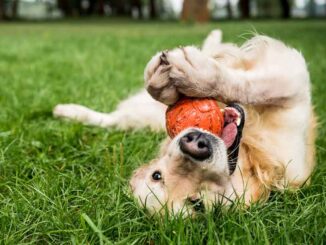
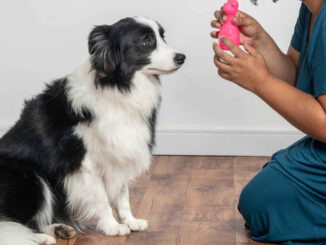
Be the first to comment